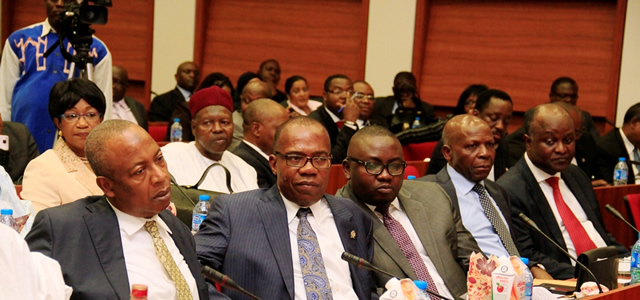Featured Articles
CBN is Prime Regulator in Banking Supervision – Senate

The Chairman, Senate Committee on Banking, Insurance and Other Financial Institutions, Senator Bassey Edet Otu says that the position of the Central Bank of Nigeria (CBN) as the prime regulator in Nigeria’s financial system cannot be disputed.
He stated this in Abuja on Monday, March 9, 2015, during the public hearing on the Insurance Brokers’ Act, 2003 (Repeal and Enactment) Bill, 2015 and the Nigeria Deposit Insurance Corporation (NDIC) Act 2012 (Repeal and Enactment) Bill, 2015.
According to him, the committee was committed to ensuring the safety of financial deposits of Nigerians and as such would not support a Bill capable of compromising the powers of both the CBN and the Nigeria Deposit Insurance Corporation (NDIC).
Senator Otu also commended the CBN for being objective and dispassionate in promoting Bills that will promote the safety of the country’s financial system.
Speaking earlier, the Deputy Governor of the CBN in charge of the Operations Directorate, Alhaji Suleiman Barau, who made a presentation on behalf of the Governor, Mr. Godwin Emefiele, identified certain provisions in the proposed NDIC Act, which he noted sought to make the NDIC a parallel regulator of banks in Nigeria.
Alhaji Barau also stressed that the NDIC Bill 2015, in its current form, equally sought to confer conflicting supervisory functions and powers on the NDIC over Nigerian banks, just as it aimed at creating overlapping regulatory responsibilities for the NDIC.
He observed that the NDIC, among other things, was equally seeking to carry out consolidated supervision of subsidiary banks without due regard to the CBN and other regulators in the financial system.
Citing trends around the world, he pointed out that since the global financial crises of the late 1990s; countries had moved towards consolidating supervision, hence a conflict would arise if primary regulatory functions were distributed among several bodies.
Barau therefore cautioned against allowing issues of conflicting interest to thrive in the financial system, even as he assured that the CBN would continue to assist the NDIC in order to strengthen it in carrying out its primary objective of protecting deposit customers of banks.
In his remarks, the Managing Director/Chief Executive Officer of the NDIC, Alhaji Umaru Ibrahim explained that the NDIC was not in any way seeking to compete with the CBN nor was it targeting to introduce provisions that were targeted at taking over some of the powers of the CBN.
Also presenting a paper at the hearing, a former CBN Deputy Governor, Banking Supervision, Mr. Victor Odozi under whose tutelage the NDIC was established in 1988 said that the corporation was established to complement and support the CBN and not to supplant and undermine it.
He therefore urged for greater collaboration between the two institutions, noting that the financial system stood to gain a lot from both bodies.
Another former Deputy Governor of the Bank, Pastor Tunde Lemo, in a brief presentation observed that the policy objective of the NDIC should be limited to deposit protection.
According to him, the NDIC should be seen as a supervisor of the deposit taking institutions for deposit protection purposes and not as a regulator as the role would be in conflict with the CBN.
Others who spoke at the hearing were unanimous that the CBN remained the only regulator in the Banking sector, but stressed that the proposed Bill should take into consideration the need for greater collaboration between the bodies to avoid turf wars.

 Flickr
Flickr Instagram
Instagram LinkedIn
LinkedIn